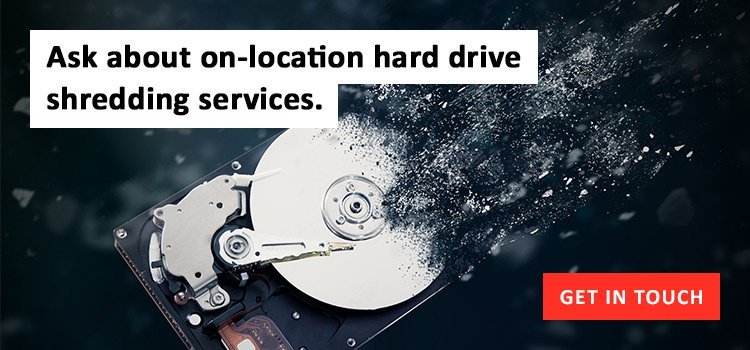Hard Drive and Document Destruction: 4 Tips for Post Tax Season
Tue, Apr 30, 2019
By: Jim Beran

Once tax season is over, many businesses take the opportunity to review their document retention schedules and destroy hard drives and documents they no longer need. It’s a good time to do it and allows you to ensure that you’re in compliance with regulations and best practices.
At Gilmore Services, our clients often ask us for assistance with document destruction during tax season. Here are 4 tips to help you with hard drive and document destruction this year.
#1: Review Your Company’s Regulatory Requirements
The first thing you should do is review your company’s regulatory requirements. Depending on the kind of documents you store, you may need to comply with HIPAA, FACTA, or Sarbanes-Oxley regulations regarding document storage and destruction. You should also pay attention to Internal Revenue Service recommendations for the maintenance of tax documents.
It’s essential to maintain credit card records, financial documents, and medical information in accordance with regulations. If you fail to do so, you may be subject to fines or even prosecution. We recommend conducting regular reviews to ensure you’re complying with all relevant regulations.
#2: Earmark Items for Destruction
After you’ve reviewed your regulatory requirements, you should do an audit of your existing documents and earmark those that should be scheduled for destruction.
Keep in mind that you should plan to keep all business and personal tax returns indefinitely. Supporting records should be kept for a minimum of three years, including:
- Bank statements
- Receipts
- Income statements
- W-2 forms and 1099 forms
- Stocks, bonds, and investment documents
Records related to older tax returns may be shredded unless you fit into one of the exceptions identified by the IRS.
You do not need to keep the following items:
- Utility bills (unless related to your tax return)
- Receipts (unless related to your tax return)
- Extra copies of contracts, receipts, or other documents
Keep in mind that keeping extra copies may put you at risk of identity theft or a data breach if they’re not stored properly.
While you review your documents, you should also review hard drives and backups to ensure they are destroyed properly.
#3: Hire a Shredding Service
Once you’ve identified the records and hard drives that must be destroyed, it’s time to hire a shredding service to handle their destruction for you. It’s common for both individuals and business owners to shred items themselves, but we recommend against that.
It’s safer and more secure to hire a NAID-certified company to shred your paper documents and records for you. Gilmore Services offers both on-site shredding and off-site shredding. In either case, you’ll be given a certificate of destruction confirming that your records have been properly destroyed and disposed of.
The same is true of hard drives. You might be tempted to rely on DIY hard drive destruction, but that’s a mistake. It’s not easy to erase all traces of sensitive data. If you try and fail, you may be leaving your data at risk of theft or misuse.
#4: Invest in Record Maintenance
Finally, tax season is a good time to invest in proper record maintenance. Hiring an company that’s experienced in secure business record management will help you stick to your document maintenance and destruction schedule and comply with regulations.
You should look for a NAID-certified company that provides online access to your records and confirmation of record destruction.
Conclusion
After tax season is over, it’s time to get your records in order. The 4 tips we’ve outlined here will help you accomplish that task and give you the peace of mind of knowing that your valuable records are protected.
To learn more about how Gilmore Services can help you with hard drive and document destruction, please click here now.
